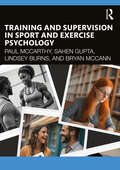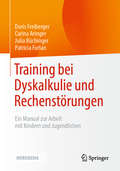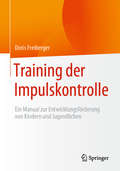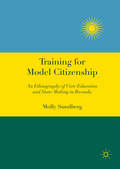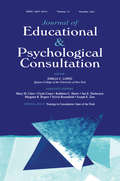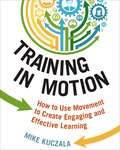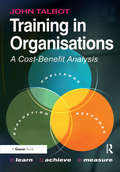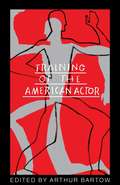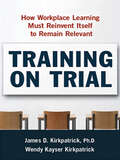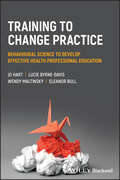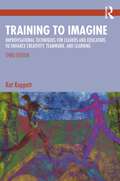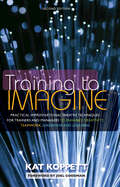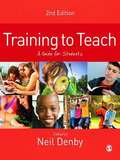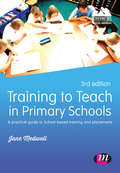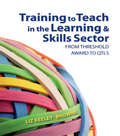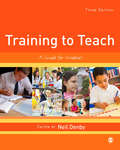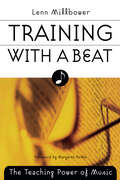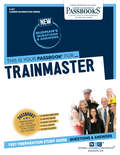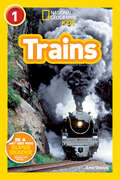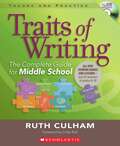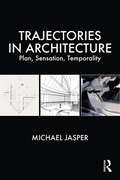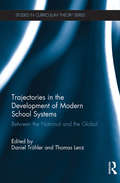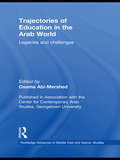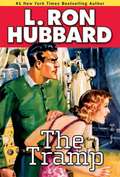- Table View
- List View
Training and Supervision in Sport and Exercise Psychology
by Paul Mccarthy Bryan McCann Lindsey Burns Sahen GuptaTraining and Supervision in Sport and Exercise Psychology presents a labyrinth of choices and challenges for trainees and supervisors, such as training and supervision mixing the science of doing sport and exercise psychology with the art of judgement and decision-making to deliver services to athletes. With a multitude of skills to master and competencies to gain, trainees and supervisors need assurances about best practice in their field and the assessments they can trust.Including cases, trainee autobiographical cases, and examples of good practice drawn from current and ex-trainees who have become sport psychology consultants, this book aims to educate trainees how to deal competently with professional and ethical guidelines. We aim to educate trainees to get started in service delivery, set up placement, work with clients, use supervision effectively, conduct academic research, and write sound assessments before preparing for a viva voce and beginning the transition to the workplace. This book shall serve trainees and their supervisors on their journey through to qualified status.Training and supervision to become a sport and exercise psychologist is of the utmost importance in the growing profession of sport and exercise psychology. This book aims to bring clarity, guidance, and support to learning and mastering professional skills in applied sport psychology service delivery. This book is key reading for undergraduates and postgraduates studying sport and exercise psychology and those studying for taught and professional doctorates in sport and exercise psychology.
Training bei Dyskalkulie und Rechenstörungen: Ein Manual zur Arbeit mit Kindern und Jugendlichen
by Doris Freiberger Carina Aringer Julia Büchinger Patricia FurlanDas vorliegende Programm ist ein umfassendes Manual, welches allen Schülerinnen und Schülern helfen soll, die Probleme mit mathematischen Grundlagen und / oder das Störungsbild der „Dyskalkulie“ entwickelt haben. Es richtet sich an Trainerinnen und Trainer, die im Bereich „Dyskalkulie“ tätig sind, Therapeutinnen und Therapeuten in diesem Bereich, sowie Kindergärten und Schulen. Das Manual dient der Prävention und als Ergänzung zum Unterrichtsstoff, ebenso zur gezielten Förderung im Einzel – oder Gruppensetting dyskalkuler Kinder und Jugendlicher.
Training der Impulskontrolle: Ein Manual zur Entwicklungsförderung von Kindern und Jugendlichen
by Doris FreibergerKinder mit einer Impulskontrollstörung fallen besonders durch ihre Persönlichkeit auf. Nach außen scheinen sie oft sehr stark zu sein, nach innen jedoch leiden sie an ihrem Unvermögen, Aufgaben so erledigen zu können wie andere gleichaltrige Kinder. Dieses Manual richtet sich an Pädagogen, Trainer und Ergotherapeuten, die mit Kindern und Jugendlichen zwischen 6-14 Jahren arbeiten und sie im Bereich der Impulskontrolle stärken möchten. Es beinhaltet komplette Stundenbilder mit Anleitungen zur Vorbereitung, benötigten Materialien und Stundenablauf.
Training for Model Citizenship
by Molly SundbergThis book provides an ethnography of a state-run civic education program based in a local neighborhood in Rwanda. In 2007, the Rwandan government launched a nationwide program, called Itorero, to teach all inhabitants about its vision of the model Rwandan citizen. Today, this ideal is pursued through remote training camps, village assemblies, and everyday forms of government. Based on ethnographic research of the life and workings of Itorero camps and the daily government of a local neighborhood in Kigali, this book asks how such a pursuit has come to affect Rwandans' relation to the state and what it may tell us about modern forms of authoritarian rule.
Training in Consultation: State of the Field:a Special Double Issue of journal of Educational and Psychological Consultation
by Emilia C. LopezFirst published in 2002. Featuring new chapters on bullying, sexual assault, natural disasters, eating disorders, and cultural considerations, the second edition of this highly popular work provides a one-stop reference for mental health professionals who face a bewildering variety of school-based crises. Key features include a focus on both prevention and intervention and ongoing discussions of the research that underlies best practice.
Training in Motion: How to Use Movement to Create Engaging and Effective Learning
by Mike KuczalaWhen people are kept from moving--whether they're sitting through a presentation or stuck behind a desk--they become restless and their attention waivers. Yet most training ignores the innate human desire for motion, resulting in participants learning less. Based on the latest neuroscience research, Training in Motion explains how movement enhances learning and introduces a unique and highly effective way to energize an audience and increase retention through simple body-focused techniques. The book shows readers how to: Tie lessons to movement to reinforce concepts * Manage learners' physical and emotional states to increase engagement and bolster memory * Use posture, physical gestures, and other movements to command interest * Employ quick physical breaks to efficiently refocus students * Turn lackluster sessions into high-achieving learning environments Practical, accessible, and packed with activities, this one-of-a-kind book helps readers add a kinesthetic component to their training so that participants stay motivated, and apply what they've learned long after they've left the classroom.
Training in Organisations: A Cost-Benefit Analysis (Ashgate Studies In Publishing History: Manuscript, Print, Digital Ser.)
by John TalbotFor many organisations, training and development remain an aspiration rather than fundamental to their business, and the consequent investment is subject to reductions or reallocations when times get tough. Yet increasing pressures from business globalisation mean that organisations are absolutely dependent on the skills of their workforce if they are to remain competitive. John Talbot's Training in Organisations: A Cost-Benefit Analysis, provides the basis for measuring and analysing the cost and value associated with training. It looks both at manual skills and management training analysis to explore the various approaches for costing training, controlling those costs and applying value analyses to the investment that is being made. Also included is a series of international comparisons across a variety of industry sizes and types which provide organisations with an important benchmark for their own spending.
Training of the American Actor
by Arthur BartowSuccessful acting must reflect a society's current beliefs. The men and women who developed each new technique were convinced that previous methods were not equal to the full challenges of their time and place, and the techniques in this book have been adapted to current needs in order to continue to be successful methods for training actors. The actor's journey is an individual one, and the actor seeks a form, or a variety of forms, of training that will assist in unlocking his own creative gifts of expression.--from the introductionThe first comprehensive survey and study of the major techniques developed by and for the American actor over the past 60 years. Each of the 10 disciplines included is described in detail by one of today's foremost practitioners.Presented in this volume are:* Lee Strasberg's Method by Anna Strasberg, Lee's former student, widow, and current director of The Lee Strasberg Theatre Institute * Stella Adler Technique by Tom Oppenheim, Stella's grandson and artistic director of the Stella Adler Institute in New York * Sanford Meisner Technique by Victoria Hart, director of the Meisner Extension at New York University * Michael Chekhov Technique and The Mask by Per Brahe, a Danish teacher inspired by Balinese dance and introduced to the Chekhov technique in Russia * Uta Hagen Technique by Carol Rosenfeld, who taught under Hagen's tutelage at the Herbert Berghof (HB) Studio * Physical Acting Inspired by Grotowski by Stephen Wangh, who studied with Jerzy Grotowski himself * The Viewpoints by Mary Overlie, the creator of Viewpoints theory * Practical Aesthetics by Robert Bella of the David Mamet-inspired Atlantic Theatre Company school * Interdisciplinary Training by Fritz Ertl, who teaches at the Playwrights Horizons Theatre School * Neoclassical Training by Louis Scheeder, director of the Classical Studio of New York UniversityArthur Bartow is the artistic director of the Department of Drama at New York University's Tisch School of the Arts. A former associate director of Theatre Communications Group, he is the author of the landmark book The Director's Voice.
Training on Trial: How Workplace Learning Must Reinvent Itself to Remain Relevant
by Jim Kirkpatrick Wendy Kayser KirkpatrickUsing a courtroom trial as a metaphor, Training on Trial seeks to get to the truth about why training fails and puts the business partnership model to work for real.While upbeat lingo abounds about &“complementing strategic objectives&” and &“driving productivity,&” the fact is that most training does not make a significant enough impact on business results, and when it does, training professionals fail to make a convincing case about the value added to the bottom line.The vaunted &“business partnership model&” has yet to be realized?and in tough economic times, when the training budget is often the first to be cut, training is on trial for its very existence. Readers on both sides of the &“courtroom&” will learn how to:Build expertise and become genuinely involved in your company's or client's businessPledge to work together to positively impact a pressing business need or pivotal business opportunityAsk the jury their expectations and revise your own to be more realistic and mutually satisfyingDevelop a plan, targeting the key drivers of performance success after training has taken placeExecute your initiative and deliver a stellar ROESM (Return on Expectations)A thought-provoking read for trainers and business unit leaders alike, Training on Trial provides a new application of the Kirkpatrick Four-Level Evaluation Model and a multitude of tips and techniques that allow lessons learned to be put into action now.
Training to Change Practice: Behavioural Science to Develop Effective Health Professional Education
by Jo Hart Lucie Byrne-Davis Wendy Maltinsky Eleanor BullBehavioural science to develop effective health professional education serves as a practical guide in the cutting-edge area of health professional education and behavioural science. This textbook will provide practical evidence-based guidance to enhance the real world impact of your health professional training, To aid in seamless reader comprehension, chapters work through clear step by step stages, with boxes to verify understanding, along with examples to work through and links to further reading if readers want to understand more about underlying theory. The book also contains a series of templates which can be adapted for use by the reader. Sample topics covered in Behavioural Science to develop effective health professional education include: Education and training as a behaviour change intervention, covering language of learning and behaviour change, with examples of behaviour change intervention approaches Defining the behaviours that you want to change, intended behavioural outcomes (IBOs), and specifying your IBOs Exploring the influences on behaviours, covering Influences on practice, and how to explore influences on each IBO Developing training to change behaviour, covering active ingredients of behaviour change activities, and the process of creating behaviourally informed trainingFor postgraduate and undergraduate health professional courses, continuing professional development providers, and providers of health professional training in medicine, nursing, dentistry, and allied health professions, Behavioural Science to develop effective health professional education is an essential resource on the subject that helps make education and training more effective.
Training to Imagine: Improvisational Techniques for Leaders and Educators to Enhance Creativity, Teamwork, and Learning
by Kat KoppettTraining to Imagine is the definitive guide to using improvisational theater techniques to enhance creativity, teamwork, leadership, and growth in professional settings.This third edition explores the principles of improvisation—trust, spontaneity, accepting offers, listening and awareness, storytelling, and presence—and demonstrates how they can be applied to real-world situations. Koppett includes updated research on the value of improvisation, fresh examples, detailed activity design flows, and over 50 activities that can be used for individual self-development, small groups, and organizational development. This edition has been updated to more explicitly tie improv principles to building inclusive environments, supporting diverse voices, and creating connection and community, ideal for both higher education and organizational contexts.Leaders, educators, and facilitators interested in using improv to strengthen their interpersonal skills will find immense value in this book.
Training to Imagine: Practical Improvisational Theatre Techniques for Trainers and Managers to Enhance Creativity, Teamwork, Leadership, and Learning
by Sivasailam Thiagi" Thiagarajan Kat Koppett Joel GoodmanCreating innovative products and game-changing processes, and adapting to new cultures and communication styles, have all become imperative for business survival. Today’s business leaders, from Fortune 500 companies on down, have discovered the value of improvisational theatre techniques to develop creativity and collaboration skills they need.Since publication of its seminal first edition, the principles and techniques pioneered in Training to Imagine have been widely adopted by organizations around the world, and have given rise to the field of Applied Improvisation. This new edition builds on the characteristics that made it the most comprehensive and most easy-to-apply resource for using improv in organizations. As before, this book translates the theories and exercises of improv into language that is familiar to business culture, and provides guidelines, case studies and exercises intended for use by individuals for self-development, for small groups, and for facilitation by corporate trainers.This revised edition places more emphasis on the development of leadership, in particular adding activities designed for individuals to develop skills on their own, or outside formal training environments. It builds upon what has been learned since 2001, presenting examples of practice, and research on the methods, that have proven to be most effective in the workplace. Kat Koppett has added a whole new section on instructional design to help users make informed choices in selecting activities to best support their objectives and corporate context, as well as numerous new exercises.This is a vital resource for trainers, executives, and leaders at all levels who want to increase their personal communication and creativity skills, and in inspire and motivate their teams. The enhanced e-book edition will incorporate video of sample activities and exercises, as well as interviews with leading Applied Improv practitioners. This material will also be available free on the Stylus Web site.
Training to Teach
by Neil DenbyTeaching is a tough and challenging job and society demands more from its teachers than ever before. This new edition is an essential companion for those training to teach providing an overview of important professional issues that all future teachers need to engage with in order to succeed in the classroom. Previously known as How to Achieve Your QTS, this Second Edition is equally valuable to those training to teach in both primary and secondary education and aims to give students the confident start they need in the classroom. Features new to this edition include more balanced primary education coverage and four new chapters on: child protection issues, teaching pupils with English as an Additional Language, cross-curricular teaching issues and your first teaching post: applications, interviews and induction. The accompanying Website www.sagepub.co.uk/denby, has been updated to include additional material expanding on and complementing the contents of the book. This book is essential reading for professional studies modules on both primary and secondary initial teacher education courses at both udergraduate and postgraduate level, and on university-based and school-based training courses. Neil Denby teaches at the School of Education and Professional Development, University of Huddersfield.
Training to Teach in Primary Schools: A practical guide to School-based training and placements
by Jane A MedwellFull of practical help and guidance, this is a must have for primary trainees on school experience, whether they are in a school-based or university-based teacher training programme. It begins by helping trainees to plan their own journey through training and beyond. Taking control of their own training in this way supports student teachers to approach the course with confidence, and secure their first teaching job. The book provides guidance on: adapting to working in school observing, planning and evaluating in school teaching on placement assessing, monitoring and reporting on children′s progress self-evaluation and how to pre-empt and resolve issues securing the first teaching job and succeeding in the NQT year For student teachers, the experience of school-based training is exciting but also challenging - this book supports them throughout and prepares them for the journey ahead. Student feedback on this book: "Having been on a variety of teaching placements myself, I know just how daunting and overwhelming experiences in school can be at times – even with a supportive mentor by your side! Hence, I felt that this book can smooth out and rectify those worries one may face during a school placement, and offers the reader a realistic insight into school experiences. In my opinion, the most useful chapter by far is the ‘Moving On’ chapter near the end of the book. This explains how to conclude a school placement, what to expect from an interview, and even how to set out a CV for a teaching position. This was not something I expected to find in this book however it was very much welcomed and is, in fact, a very important, valuable part of the book. This is the type of book you can buy on your very first day of teacher training and use well into your days as a newly qualified teacher." - Jasmin, Primary Teacher Trainee (University of Northampton)
Training to Teach in the Learning and Skills Sector: From Threshold Award to QTLS
by Liz Keeley-BrowneFirst published in 2006. Routledge is an imprint of Taylor & Francis, an informa company.
Training to Teach: A Guide for Students
by Neil DenbyTeaching is a tough and challenging job and society demands more from its teachers than ever before. This new edition is an essential companion for those training to teach, providing an overview of important professional issues that all future teachers need to engage with in order to succeed in the classroom. Aiming to give you the confident start you need in the classroom, this third edition is equally valuable to those training to teach in both primary and secondary education, and includes: • New chapters on: inclusion; school-based training; creativity; and digital technologies • Increased coverage of behaviour management • A new feature outlining the relevant Teachers’ Standards at the start of each chapter The accompanying website https://study.sagepub.com/denby3e, has been updated to include additional material expanding on and complementing the contents of the book. This book is essential reading for professional studies modules on both primary and secondary initial teacher education courses at both undergraduate and postgraduate level, and on university-based and school-based training courses. Neil Denby is recently retired from the School of Education and Professional Development, University of Huddersfield and now works as an independent educational consultant.
Training to Teach: A Guide for Students
by Neil DenbyTeaching is a tough and challenging job and society demands more from its teachers than ever before. This new edition is an essential companion for those training to teach, providing an overview of important professional issues that all future teachers need to engage with in order to succeed in the classroom. Aiming to give you the confident start you need in the classroom, this third edition is equally valuable to those training to teach in both primary and secondary education, and includes: * New chapters on: inclusion; school-based training; creativity; and digital technologies * Increased coverage of behaviour management * A new feature outlining the relevant Teachers' Standards at the start of each chapter The accompanying website https://study.sagepub.com/denby3e, has been updated to include additional material expanding on and complementing the contents of the book. This book is essential reading for professional studies modules on both primary and secondary initial teacher education courses at both undergraduate and postgraduate level, and on university-based and school-based training courses. Neil Denby is recently retired from the School of Education and Professional Development, University of Huddersfield and now works as an independent educational consultant.
Training with a Beat: The Teaching Power of Music
by Lenn MillbowerMusic holds amazing power over us. While it permeates and gives rhythm to our lives, most of us take it for granted and rarely consider its impact and potential. Training with a Beat is a lively introduction to understanding that force, and applying it to training.This practical "how-to" guide is written with the musical layperson in mind. The author reveals in straightforward language why music is a critical learning resource, explains the necessary concepts and terms, and concludes with vivid examples of practice and a list of suggested resources. He provides all the background and tools to enable trainers and educators confidently to use music to improve learning.A valuable and extensive appendix lists recommended CDs and offers track-by-track examples of potential training applications.Readers of this book will:Discover how music contributes to learning Understand music theory principles relevant to learningKnow how to select music appropriate for different training situationsDiscover effective musical games and activities and how they teachUnderstand the related legal and copyright issues This unique resource will be welcomed by trainers, facilitators, presenters and adult educators looking for additional tools to add impact to their material and improve learning outcomes.
Trainmaster: Passbooks Study Guide (Career Examination Series)
by National Learning CorporationThe Trainmaster Passbook® prepares you for your test by allowing you to take practice exams in the subjects you need to study. It provides hundreds of questions and answers in the areas that will likely be covered on your upcoming exam.
Trains (Readers)
by Amy ShieldsChoo Choo! Kids love trains! Especially the old-timey steam engines found in amusement parks and zoos. But what about a super-speeder in Japan that zooms on the track at 361 miles per hour? Or the world's longest freight train, stretching on for a whopping 4.6 miles? Or futuristic railways in the sky? In this level 1 reader, young readers will discover a whole new way of looking at trains!National Geographic supports K-12 educators with ELA Common Core Resources.Visit www.natgeoed.org/commoncore for more information.
Traits of Writing: The Complete Guide for Middle School
by Ruth CulhamEffective, easy-to-use tools for trait-based assessment and instruction―just for middle school teachers. Includes printable reproducible forms! The traits have revolutionized the way writing is taught. And nobody knows the traits better than Ruth Culham, who has written over 25 books and conducted countless workshops for teachers of all grades. Now, Ruth turns her expert eye to middle school. The Traits of Writing: The Complete Guide for Middle School contains classroom-tested materials developed just for teachers of grades 6-8. Brand-new scoring guides, scored sample papers, Think Abouts, warm-up exercises, focus lessons, and activities for each trait, organized by that trait's key qualities, make it easy to assess writing and deliver targeted instruction. With CD of reproducible forms that is compatible with interactive white boards. - The most comprehensive guide to trait-based teaching in middle school- An all-in-one resource for building a writing traits classroom, from the ground up- Useful trait-focused tips and tools that enable middle school teachers to hit the ground running- Research-based strategies, presented in a friendly, encouraging tone- The perfect companion to Culham's other trait resources
Trajectories in Architecture: Plan, Sensation, Temporality
by Michael JasperTrajectories in Architecture: Plan, Sensation, Temporality presents a compelling examination of underlying issues in late-twentieth-century architecture. Three formal preoccupations and conceptual orientations are used as guiding threads or trajectories. These three trajectories – the plan as conceptual device, a logic of sensation, and temporalities – serve to organise individual chapters in the central sections of the book and provide a new lens to the study of period work, revealing architectural conditions and consequent spatial effects little explored to date. Trajectories in Architecture adds to scholarship and expands our understanding of the role of conceptual and formal criteria in the analysis and creation of works of architecture. The book provides potentially transformative new interpretations of influential architects and key projects from the last half of the twentieth century to reveal new alignments and potentialities in architecture’s recent past as a contribution to identifying future possibilities. In so doing, the book argues for the still-latent potential in modern architecture’s traditions and design principles and their future expression. Trajectories in Architecture includes analysis of significant projects of Le Corbusier, Peter Eisenman, Zaha Hadid, John Hejduk, Louis I. Kahn, and I. M. Pei.
Trajectories in the Development of Modern School Systems: Between the National and the Global (Studies in Curriculum Theory Series)
by Daniel Tröhler Thomas LenzAs contemporary education becomes increasingly tied to global economic power, national school systems attempting to influence one another inevitably confront significant tensions caused by differences in heritage, politics, and formal structures. Trajectories in the Development of Modern School Systems provides a comprehensive theoretical and empirical critique of the reform movements that seek to homogenize schooling around the world. Informed by historical and sociological insight into a variety of nations and eras, these in-depth case studies reveal how and why sweeping, convergent reform agendas clash with specific institutional policies, practices, and curricula. Countering current theoretical models which fail to address the potential pressures born from these challenging isomorphic developments, this book illuminates the cultural idiosyncrasies that both produce and problematize global reform efforts and offers a new way of understanding curriculum as a manifestation of national identity.
Trajectories of Education in the Arab World: Legacies and Challenges (Routledge Advances in Middle East and Islamic Studies)
by Osama Abi-MershedTrajectories of Education in the Arab World gives a broad yet detailed historical and geographical overview of education in Arab countries. Drawing on pre-modern and modern educational concepts, systems, and practices in the Arab world, this book examines the impact of Western cultural influence, the opportunities for reform and the sustainability of current initiatives. The contributors bring together analyses and case studies of educational standards and structures in the Arab world, from the classical Islamic period to contemporary local and international efforts to re-define the changing needs and purposes of Arab education in the contexts of modernization, multiculturalism, and globalization. Taking a thematic and chronological approach, the first section contrasts the traditional notions, approaches, and standards of education with the changes that were initiated or imposed by European influences in the nineteenth century. The chapters then focus on the role of modern state-based educational systems in constructing and preserving national identities, cultures, and citizenries and concentrates on the role of education in state-formation and the reproduction of socio-political hierarchies. The success of educational reforms and policy-making is then assessed, offering perspectives on future trends and prospects for generating institutional and organizational change. This book will be of interest to graduate and postgraduate students and scholars of education, history, Arab and Islamic history and the Middle East and North Africa.
Tramp, The
by L. Ron HubbardExplore this fantastical tale. Down-on-his-luck tramp Doughface Jack has been shot while trying to escape from a cop and a train brakeman--causing him to fall from the train and crush his skull. A local doctor performs emergency surgery to save Doughface's life, patching up and stitching together the two halves of his brain and then sealing the cranium with a silver bowl.While Doughface miraculously survives, he also acquires phenomenal mental powers: he can instantaneously heal or kill, or make the old young. Terrified of his newfound abilities, Doughface flees the university where he was being kept for examination, only to cross paths with a vengeful and beautiful woman bound to reach the ultimate seat of power--using Jack to destroy anything that gets in her way! "...a series not to be missed by any true pulp-fiction fan." --Comics Buyers Guide
